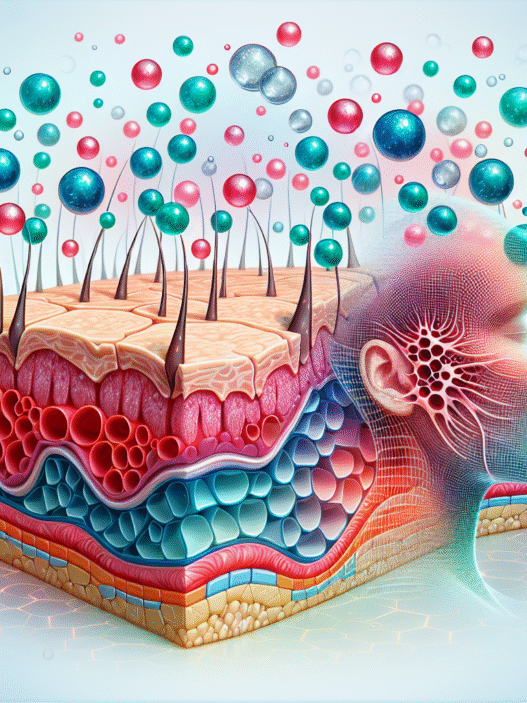Understanding Hyaluronic Acid
Hyaluronic acid (HA) has garnered significant attention within the beauty and skincare community for its remarkable properties in skin hydration and regeneration. Understanding its importance and functions can greatly enhance skincare routines, especially for those seeking to maintain youthful skin.
Importance of Hyaluronic Acid
Hyaluronic acid is often termed as a key player in tissue regeneration. It plays a vital role in modulating inflammation, cellular migration, and angiogenesis, which are crucial phases in the wound healing process. The effects of HA are closely related to its molecular size. High molecular weight HA exhibits anti-inflammatory and immunosuppressive properties, while low molecular weight HA serves as a potent pro-inflammatory molecule (PubMed). This dual functionality makes HA an essential component in both skincare and medical applications.
HA is a hygroscopic molecule, meaning it has the ability to attract and bind water molecules. It can bind up to 1000 times its volume in water, making it instrumental in providing hydration to the stratum corneum and the dermis. This unique ability aids in regulating water balance, osmotic pressure, and the flow of ions, thereby maintaining skin structure and stability.
Molecular Weight and Functions
The properties of hyaluronic acid vary according to its molecular size. HA exists in different lengths which can be categorized broadly as high molecular weight (HMW) and low molecular weight (LMW).
| Molecular Weight | Properties |
|---|---|
| High Molecular Weight HA | Exhibits anti-inflammatory and immunosuppressive effects; aids in maintaining skin hydration. |
| Low Molecular Weight HA | Acts as a pro-inflammatory molecule; promotes wound healing and tissue regeneration. |
HA synthesis is facilitated by specific enzymes known as hyaluronic acid synthases (HAS), primarily HAS-1, HAS-2, and HAS-3. These enzymes produce HA chains of varying lengths, which are then regulated by hyaluronidases (HYAL) that degrade HA into smaller fragments (PubMed Central).
Due to its ability to act as a scaffold structure for tissue growth, HA is integral to wound healing processes (Cleveland Clinic). Understanding how hyaluronic acid interacts with skin cells enhances its use in various hyaluronic acid products geared toward skin rejuvenation and moisture retention.
Hyaluronic Acid for Skin Hydration
Role in Skin Moisture
Hyaluronic acid (HA) plays a pivotal role in skin hydration, acting as a natural moisture-retaining compound. This unique molecule can hold up to 1,000 times its weight in water, making it highly effective in keeping the skin plump and hydrated. As people age, the naturally occurring levels of hyaluronic acid in the skin diminish, contributing to dryness, fine lines, and wrinkles (Medical News Today).
The ability of HA to absorb and retain moisture results in a protective barrier that promotes skin elasticity and softness. Maintaining optimal moisture levels is essential for a youthful appearance and can reduce the development of visible signs of aging.
Benefits for Skin Hydration
Using hyaluronic acid can significantly enhance skin hydration, leading to multiple benefits. Research has shown that the application of HA serum leads to a 134% increase in skin hydration immediately after application, with a sustained improvement of 55% over a six-week period. Additionally, HA-containing products have shown positive effects on skin smoothness, fine lines, and overall appearance, improving skin plumpness and combatting signs of photoaging.
| Benefit | Result |
|---|---|
| Immediate hydration boost | 134% increase in hydration |
| Sustained hydration improvement | 55% increase at week 6 |
| Improvement in skin smoothness | Statistically significant |
| Reduction in fine lines and wrinkles | Statistically significant |
Hyaluronic acid and skin regeneration are closely linked, as adequate hydration plays a crucial role in tissue repair and regeneration. By incorporating HA into daily skincare routines, individuals can achieve healthier, more resilient skin. For those interested in exploring various applications of HA, consider products such as hyaluronic acid serums and hyaluronic acid moisturizers to experience its hydrating benefits firsthand.
Hyaluronic Acid in Skincare Products
Hyaluronic acid (HA) has grown significantly in popularity within the beauty and skincare industry, particularly for its impressive benefits related to skin regeneration and hydration. This section covers the two main forms in which hyaluronic acid is utilized in skincare: topical applications and oral supplements.
Topical Applications
Topical applications of hyaluronic acid come in various forms, including serums, creams, and moisturizers. When applied directly to the skin, HA acts as a humectant, helping the skin retain moisture. A study involving 40 women aged 30 to 65 demonstrated that applying HA twice daily significantly improved skin hydration, smoothness, and elasticity after six weeks.
| Product Type | Key Benefits |
|---|---|
| Hyaluronic Acid Serum | Intense hydration, plumps skin, reduces wrinkles |
| Hyaluronic Acid Moisturizer | Locks in moisture, enhances skin barrier |
| Hyaluronic Acid Cream | Soothes dry skin, provides long-lasting hydration |
Topical HA is considered effective for various skin types and is often used in conjunction with other active ingredients to enhance overall skin health. These products can assist in wound healing by regulating inflammation, which is vital in effective tissue regeneration.
For those specifically looking to incorporate hyaluronic acid into their skincare routine, options include hyaluronic acid serum or hyaluronic acid moisturizer, both of which are designed to improve hydration levels in the skin.
Oral Supplements
In addition to topical applications, hyaluronic acid is also available in oral supplement form. A 2023 study involving 123 females found that oral hyaluronic acid significantly improved skin hydration, tone, and epidermal thickness (Medical News Today). These supplements can serve as an additional strategy for enhancing skin health from within.
| Supplement Form | Key Benefits |
|---|---|
| Hyaluronic Acid Supplements | Improves skin hydration, promotes elasticity |
| Hyaluronic Acid Injections | Provides targeted skin rejuvenation for specific areas |
Oral HA supplements may work in synergy with topical formulations, amplifying their benefits. Moreover, the effects of hyaluronic acid supplements extend beyond skin hydration; they are also utilized in joint health and mobility.
For those interested in complementing their skincare routine with internal support, options like hyaluronic acid supplements provide a convenient way to potentially enhance skin quality and overall health. In either application, the adoption of hyaluronic acid represents a promising avenue for those looking to rejuvenate their skin through effective hydration and regeneration strategies.
Health Benefits of Hyaluronic Acid
Hyaluronic acid (HA) is not only known for its hydrating properties; it also plays a critical role in skin regeneration and wound healing. This section explores the significant health benefits of hyaluronic acid in these areas.
Skin Regeneration
Hyaluronic acid is recognized as a key player in the tissue regeneration process. It modulates essential phases of healing, such as inflammation, cellular migration, and angiogenesis (PubMed). By acting as a scaffold structure, HA supports the development of new tissues, making it vital for overall skin rejuvenation.
Studies have shown that topical applications of hyaluronic acid can significantly enhance skin hydration, smoothness, and elasticity. One particular study involving 40 females aged 30 to 65 found that those who applied HA twice daily experienced notable improvements in these areas after six weeks. In a formulation containing varying molecular weights of HA, participants reported skin plumping and a more youthful appearance, further emphasizing the importance of HA in skin regeneration.
| Parameter | Improvement Over 6 Weeks |
|---|---|
| Skin Hydration | Significant |
| Skin Smoothness | Significant |
| Skin Elasticity | Significant |
Wound Healing Properties
The healing properties of hyaluronic acid extend to the treatment of various acute wounds, including burns and diabetic foot ulcers. It has been shown to improve wound closure and the appearance of scars in postsurgical situations. The ability of HA to retain moisture and support tissue growth makes it a valuable asset in wound healing.
HA’s effectiveness in this context can be attributed to its dual role as both a hydrating agent and a facilitator of cellular regeneration. Its anti-inflammatory properties help reduce swelling and promote healing, providing a holistic approach to wound care. Overall, the inclusion of hyaluronic acid in skincare routines can significantly enhance skin health and recovery, contributing to a youthful appearance.
For optimal hydration and regeneration benefits, consider incorporating products like hyaluronic acid serum or hyaluronic acid moisturizer into your skincare regimen.
Hyaluronic Acid in Anti-aging
Hyaluronic acid (HA) is widely recognized for its role in the aging process of the skin. Its ability to retain moisture and promote skin health makes it an essential ingredient in anti-aging skincare.
Effects on Skin Aging
As individuals age, the natural production of hyaluronic acid in the skin decreases, contributing to the development of fine lines, wrinkles, and a loss of firmness. A significant decrease in HA content has been observed in photoexposed skin, which can further contribute to extrinsic aging caused by UV radiation. Hyaluronic acid helps to counteract these effects by attracting and retaining moisture, which in turn smooths the skin and reduces the visibility of wrinkles.
The ability of HA to strengthen the skin’s natural barriers allows it to lock in moisture, slowing down the deterioration of the lipid barrier and providing long-term protection to the skin. This hydration leads to a more youthful appearance by tightening the overall complexion and firming facial contours.
| Aging Effect | Hyaluronic Acid Response |
|---|---|
| Decreased moisture retention | Attracts and retains moisture |
| Appearance of fine lines | Smoothens skin and softens lines |
| Loss of skin firmness | Tightens and firms facial contours |
Benefits for Skin Elasticity
Hyaluronic acid is crucial for maintaining skin elasticity, which tends to diminish with age. As HA helps to retain moisture, it promotes a plumper and more youthful look that is often associated with elasticity. The hydration provided by HA not only gives the skin a fuller appearance but also enhances the skin’s texture, leading to smoother skin cells and promoting regeneration.
Incorporating products with hyaluronic acid, such as hyaluronic acid creams or hyaluronic acid serums, into a daily skincare routine can significantly improve skin elasticity and help combat the visible signs of aging.
For additional benefits, hyaluronic acid can also complement other skincare ingredients, enhancing overall effectiveness in anti-aging formulations. Its ability to work synergistically with other compounds such as collagen can provide comprehensive rejuvenation for the skin, making it a staple in anti-aging strategies.
Safety and Considerations
Usage Safety
Using hyaluronic acid, whether through topical applications or supplements, is generally considered safe for most individuals. Hyaluronic acid can be found in various products, including hyaluronic acid serum, hyaluronic acid cream, and hyaluronic acid injections. People with sensitive skin should start with a patch test when trying a new product that contains hyaluronic acid to ensure there are no adverse reactions.
When incorporating hyaluronic acid into a skincare routine, choosing products with smaller molecule sizes is beneficial. Research indicates that larger hyaluronic acid molecules, particularly those above 500 kDa, have difficulty penetrating the skin barrier, so smaller formulations may offer better effectiveness (Healthline).
If using oral supplements, it is recommended to follow the dosage instructions provided on the packaging or as advised by a healthcare professional. For skincare enthusiasts, it’s crucial to be aware of the concentration of hyaluronic acid in any product, as formulas with higher concentrations may be more potent.
Potential Side Effects
While hyaluronic acid is generally well-tolerated, some individuals may experience mild side effects. Common side effects may include:
| Side Effect | Description |
|---|---|
| Skin Irritation | Occasional redness or irritation might occur, especially in those with sensitive skin. |
| Allergic Reaction | Rarely, an individual may have an allergic reaction, leading to swelling or rash. |
| Dryness | Overuse of products containing hyaluronic acid without proper hydration may lead to dryness. |
If side effects occur, it is advisable to discontinue use and consult a healthcare professional. Additionally, while hyaluronic acid can help reduce the visibility of fine lines and promote skin cell regeneration, one must remember that individual results may vary based on skin type and condition.
Always consult a dermatologist or healthcare provider for personalized advice regarding the use of hyaluronic acid, especially if one has preexisting skin conditions or is using multiple skin treatments. For more information on the benefits and applications of hyaluronic acid, visit our pages on hyaluronic acid benefits, hyaluronic acid supplements, and hyaluronic acid for skin.





















